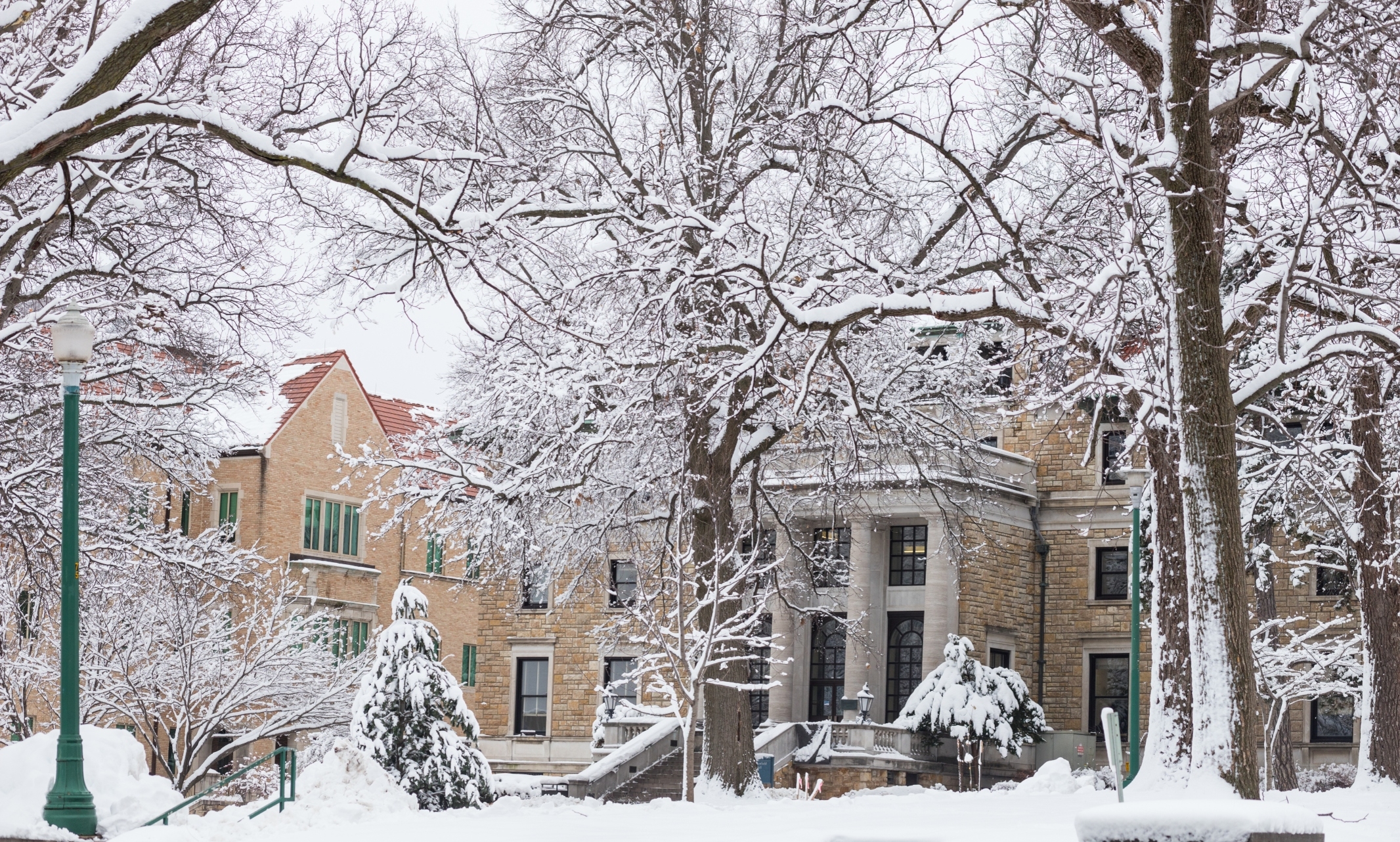
Here’s how to give
While the UMKC campus is closed during Winter Break, it’s still easy to make a year-end gift by observing the following guidelines.
UMKC offices will be closed Monday, Dec. 26 through Monday, Jan. 2. All gifts must hit UMKC Foundation accounts by Dec. 31 to receive tax credit for the 2022 calendar year. Checks and cash need to be postmarked on or before Dec. 31.
Credit card and stock gifts must hit the UMKC Foundation accounts by Dec. 31 to receive tax-credit for the 2022 calendar year. Checks and cash need to be postmarked on or before Dec. 31.
The date UMKC receives and processes checks and cash from the mail has NO impact on a donor’s taxable year contributions. The “gift date” for the IRS is the date the donor relinquished control, not the date the gift is processed.
Availability and Contacts
The Office of Gift Processing will be available Friday Dec. 30 from 8 a.m. to noon to accept year-end gifts. The Office of Gift Processing will be closed during the remainder of winter break and will re-open with regular business hours on Tuesday, Jan. 3.
The UMKC Foundation Office will be closed during winter break. A few staff will be on rotation remotely during the period. Should you have any inquiries during that time, please call 816-235-5778 and someone will return your call.
For any stock gifts or wire transfers, please contact Tram Nguyen at nguyentram@umkc.edu for the transfer form and DTC instructions. Stock gifts must be received into the account on or before Dec. 31 in order to be reflected in 2022 tax period, per the IRS.
Inquiries about all other year-end gifts can be directed to Sara Hampton at 816-235-5329 or via email to umkcgiftprocessing@umkc.edu. The Office of Gift Processing will also be taking calls at 816-235-1566 during the office hours listed above.
Gift Timing
Checks must be received in the Gift Processing office by Friday, , Jan. 13, 2023, in an envelope postmarked on or prior to Dec. 31, 2022, to be credited in the 2022 tax year. Gifts received after that date will not automatically be included in processing for the annual tax receipt. If the envelope received is postmarked after Dec. 31, it will be counted as a 2023 gift.Donors should send their checks to the address below:
UMKC Office of Gift Processing 112 Administrative Center 5115 Oak Street Kansas City, MO 64112
Stock or Mutual Funds – Please contact Tram Nguyen at nguyentram@umkc.edu for the transfer form and DTC instructions. Stock gifts must be received into the account on or before Dec. 31 in order to be reflected in 2022 tax period, per the IRS.
In order to liquidate the stock gift, it is required to provide the donor’s name, number of shares, security, expected date of transfer and area for where the gift is intended. This information can be completed on the transfer form or sent via email. Stock gifts will not be liquidated until confirmation of this information is received.
Mutual funds take an additional 3-5+ business days before posting to our account. Please advise your donors to have their brokers initiate any mutual fund transfers no later than Dec. 20. Regular equity stock takes 24 hours to post to our account.
Credit card transactions must be received by the Office of Gift Processing by noon Dec. 31 to run that day and count as a year-end gift. Credit card gifts will be accepted through the online UMKC Foundation website until midnight on Dec. 31 and will be reflected as a 2022 gift. Any online credit card gifts received after midnight Dec. 31st will be dated in January.Gifts received after hours may be deposited in the night deposit box located beside the Cashiers Office at Admin Center 112 and will be processed the following business day. Credit card gifts received through the lockbox will be dated the following business day.Pursuant to Curators Rules 208 and 212, all gifts should be transferred, with original documentation (including postmarked envelopes), to the Gift Processing Office within 24 hours of their arrival to any school, college or department.
Additional Reference Information
https://www.umkc.edu/news/posts/2021/december/donation-process-during-umkc-campus-closure.html
https://umkcfoundation.org/donation-process-during-umkc-campus-closure/
Dec 23, 2022
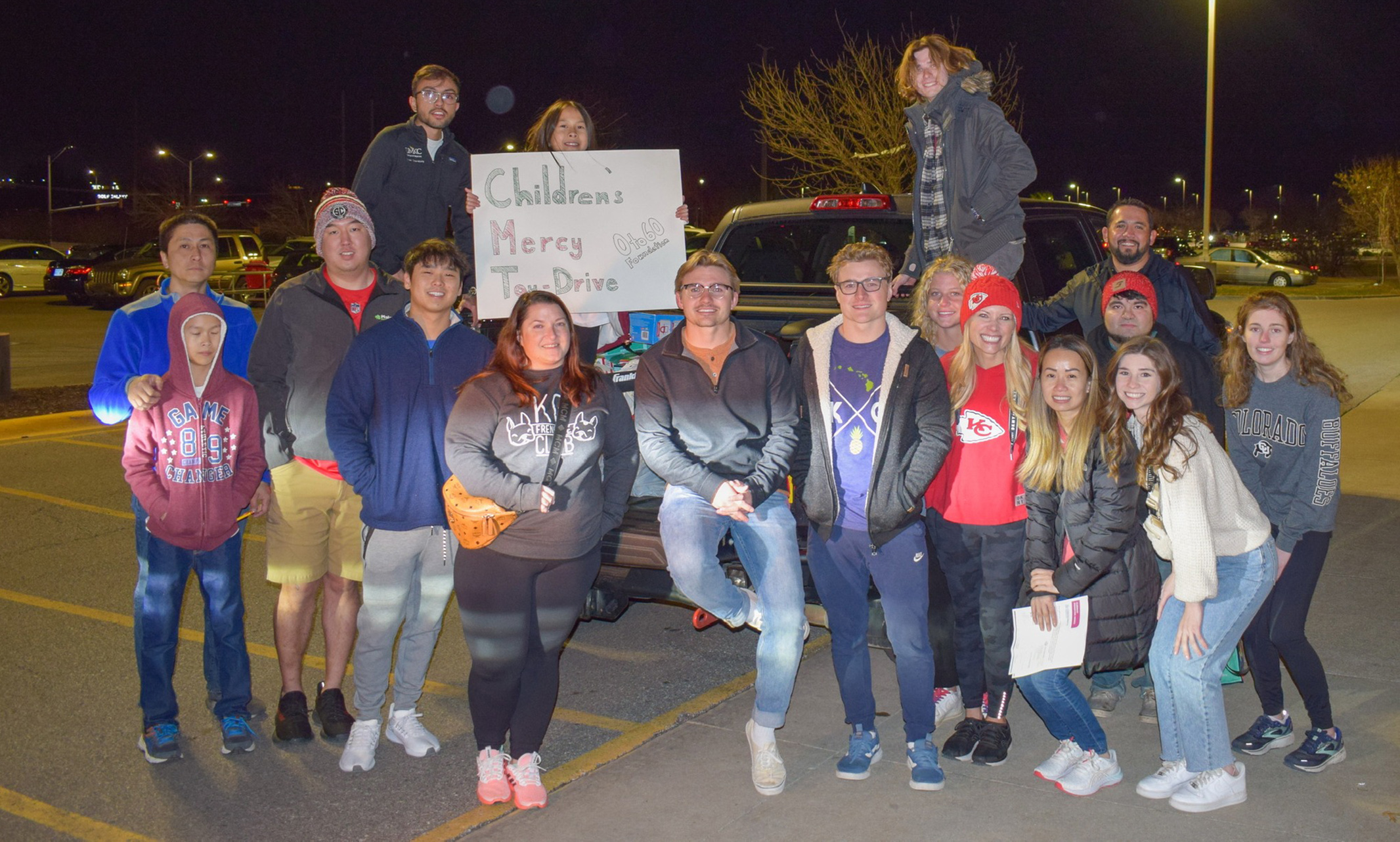
Parade of exotic cars delivers toys and gifts to Children’s Mercy-Kansas City Hospital
Santa drives a Lamborghini. A Ferrari. Take your pick of sports cars, police cars and fire trucks, too.
That was the case on December 11 when a couple of UMKC School of Medicine students who also happen to be car enthusiasts organized Operation Santa’s Sleigh, a parade of more than 30 exotic cars with police and fire department escort that delivered nearly $11,000 of toys and gifts to Children’s Mercy-Kansas City Hospital.
“Many kids get sick and find themselves in the hospital during the winter holidays, which is supposed to be one of the happiest times of the year,” said UMKC medical student Rohan Chakrabarty. “We work closely with Children’s Mercy Hospital, so we chose to partner with them in a toy-drive project with a car-enthusiast twist.”
Chakrabarty and classmate Dylan Hailey are self-described car fanatics. Earlier this year the two decided to put their passion for cars to work organizing car shows and related charity events to benefit causes related to health care.
The pair organized their first event, a car show with the theme Cars Beyond the Boulevard, last May to benefit Care Beyond the Boulevard, a mobile medical clinic that serves the homeless and poverty stricken in downtown Kansas City. With the help of some of Kansas City’s leading car clubs, their show drew nearly 300 cars and raised more than $12,000 for the clinic.
“We had some goals in mind about how many cars we wanted and how much money we wanted to raise and we smashed all of them,” Hailey said. “It was awesome. We were just so stoked by how successful it was.”
It was enough that the pair went a step further in September, working with a lawyer the pair created their own non-profit organization. The 0-to-60 Foundation partners with some of Kansas City’s top car clubs, such as KC Exotics & Supercar Club and the Dream Team Car Club KC, to organize charity events.
“They have been super welcoming of us and, honestly, they really have become our friends and the community people we can turn to if we have questions about things,” Chakrabarty said. “We just used our passion and started networking with a bunch of these people. Obviously, they have a shared passion with us with cars and they liked hearing our story.”
Chakrabarty and Hailey put together an executive board for the 0-to-60 Foundation and with the help of medical students Lara Makhoul, Shelby Soukup and Isabella Boedefeld and others, assembled teams of nearly 50 students from throughout the UMKC community to help the cause.
The next idea was to create one big event that anyone – car enthusiast or not – could get involved with. That became Operation Santa’s Sleigh. Reaching out to local companies and doing fundraisers, the foundation raised $10,832 dollars. More than 20 UMKC students and car club members then met to participate in two toy buying events at local Target stores. The first event filled more than 12 shopping carts with purchases.
The group also reached out to the Kansas City police and fire departments, which agreed to get involved and provide an escort for an exotic car parade that totaled nearly 50 vehicles from Kansas City’s World War I Memorial to Children’s Mercy to deliver the toys.
Many of those went to the hospital’s Snowflake Shop, which will allow families and patients to pick up gifts at no cost. Others will go to units throughout the hospital that can be used communally, Chakrabarty said.
“I can’t imagine being a kid during Christmas and having to be in a hospital, not to mention the other struggles those families are experiencing during this time,” said Chakrabarty, who had his own hospital experience as a child who underwent an open-heart surgery. “You put all that together and it made me feel like this would be something good for us to do.”
Chakrabarty and Hailey say they already have their next event in mind, organizing another car show to help Care Beyond the Boulevard raise funds to purchase and equip a new clinic bus.
“We think we could definitely blow some of the donations that we’ve had so far out of the water,” Chakrabarty said. “We’re thinking really big and want to make sure we make a really big impact. We have the gears turning in our heads.”
Of course, Chakrabarty is willing to admit that there may be a little more than altruistic motives behind their efforts.
“Some of these events are selfish for us because we get to see all the cars, and in some cases get to drive some of these cool cars,” he said. “That’s really awesome. It kind of comes full circle.”
Dec 20, 2022
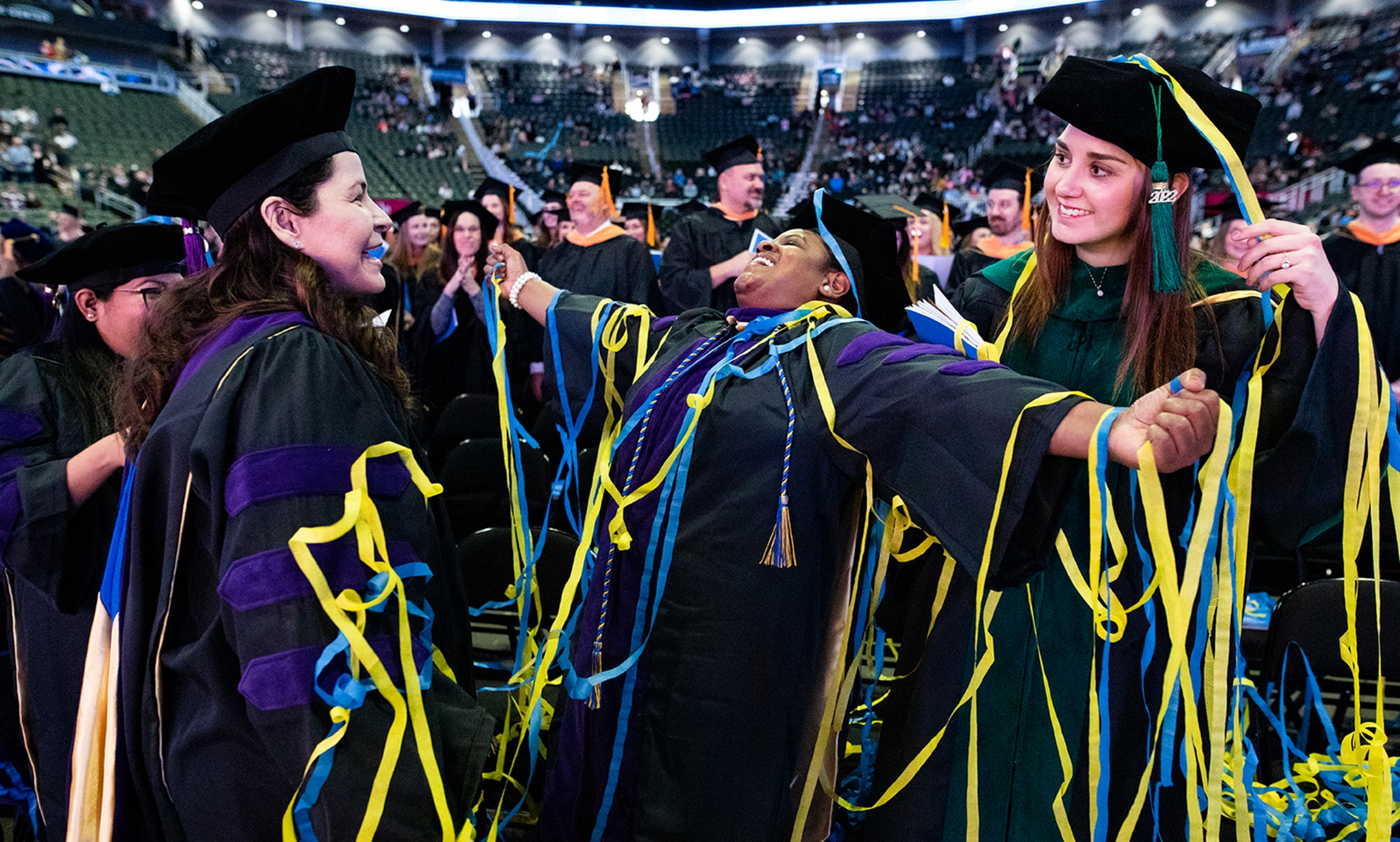
More than 800 degrees conferred
Kansas City’s university welcomed more than 800 graduates and their families at T-Mobile Center for the 2022 Mid-Year Commencement Ceremony Sunday.
University of Missouri-Kansas City Provost and Executive Vice Chancellor Jenny Lundgren, Ph.D. presided as Chief Marshal of the event.
“We are delighted to be here today at the beautiful T-Mobile Center to continue our new tradition of celebrating our graduates at iconic Kansas City locations,” said Lundgren. UMKC Chancellor Mauli Agrawal reminded graduates of their perseverance. Agrawal said that having lived through numerous challenging events such as terrorist attacks, wars, economic hardships and a global pandemic, graduates have already shown they are up to any challenge.“You have acquired the knowledge, confidence and skills you’ll need to navigate an ever-shifting landscape,” said Agrawal. “More challenges surely await you, but I know, and you know that you are up those challenges.”Two-time Emmy Award winner, UMKC alumnus and announcer for the Washington Nationals baseball team Bob Carpenter (B.A. ’75) gave the keynote address. Carpenter told graduates to expect the unexpected as things do not always go to plan. But he stressed that even in adversity, attitude is everything.“I hope as we go along, wherever you go in your career or in your life, that you have a spirit of gratitude,” said Carpenter.
Carpenter also advised graduates to keep a positive mindset and to share their success with others. “Don’t ever leave out a word of encouragement for those who you are working with, or those who you are working for,” said Carpenter. “When you achieve success, stop and think, ‘What did I do to get here, how do I stay here and who helped me get here?’ Then take that success and use it to help somebody else.”Following the event, graduates met their loved ones for hugs, photos and celebrations of their achievements.
Dec 18, 2022
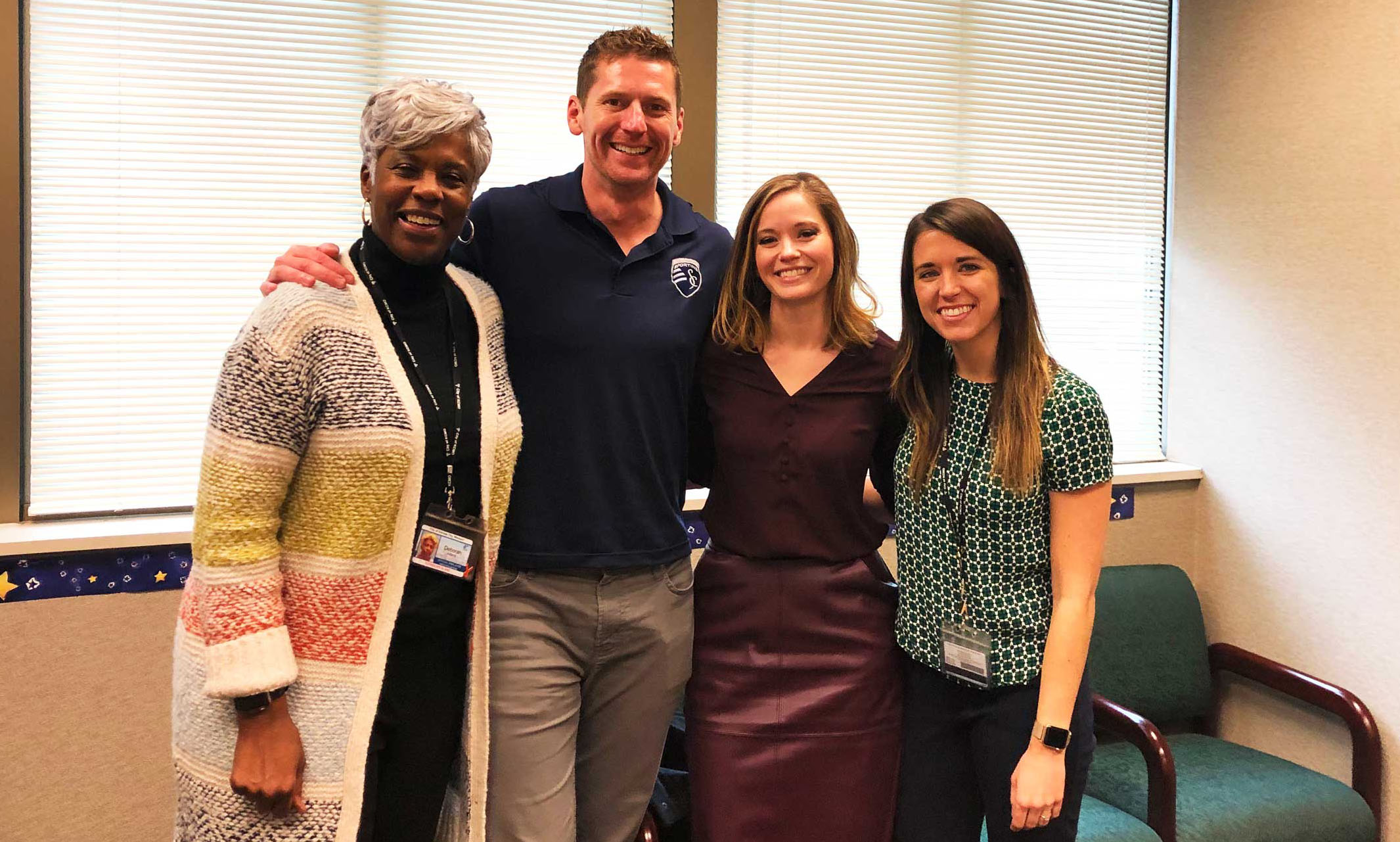
Joseph Lightner analyzed program through the Kansas City Health Department
There’s a shift happening in HIV prevention and care, and UMKC public health researcher Joseph Lightner, Ph.D., is gathering the data to back up that shift. According to Lightner, an assistant professor in the UMKC School of Nursing and Health Studies, HIV is no longer a disease of behavior, but a disease of poverty. The current medications used to treat the disease are so effective that a person with HIV who is following the regimen can live their life with a nearly undetectable amount of HIV in the blood.
According to the National Institute of Allergy and Infectious Diseases, there is an overwhelming body of clinical evidence firmly establishing that when HIV is undetectable it becomes untransmittable, a concept the scientific community has dubbed U=U. Thus, encouraging and maintaining treatment for HIV is a powerful weapon in fighting the disease.
Researchers like Lightner are looking at interventions, beyond antiretroviral therapy, that help individuals with HIV successfully achieve an undetectable viral load, the amount of HIV in the blood. One such initiative Lighter studied is KC Life 360, a program through the Kansas City Public Health Department that provides housing and employment support to low-income, uninsured and under-insured persons living with HIV in racial and ethnic minority communities.
According to Lightner, it’s a critical group in HIV prevention, since most new HIV cases are occurring in these marginalized individuals. That knowledge has led the HIV care community to adopt a housing-first model nationally because data shows that homelessness and housing instability are major threats to HIV management.
“When someone is living on the street, they're not going to take their meds. It's not feasible for an unhoused person to carry around a three-month supply of their HIV meds,” Lightner said. “If we get these individuals housed and they have a safe place to take and store their medications, downstream that translates into treatment as prevention and reduces later infections.”
In conjunction with the Kansas City Health Department, Lightner examined the outcomes of the intervention to improve housing and employment for the individuals in KC Life 360. His research found that the individuals within the study were 25 times more likely to be housed and twice as likely to have improved their employment status. Most importantly, the data showed that the viral suppression improved among those within the study.
“What I want people to see from this research is that to solve the HIV epidemic, it's going to take multi-level interventions that focus on the whole person," Lightner said. "These are people who want to be members of society just like anybody else."
Although Lightner’s primary research focus within public health is physical activity, he continues to come back to HIV research. His team also has studied how HIV stigma affects individuals professionally and socially, as well as how best to provide treatment to those living with HIV. He said that the good thing about public health is that it’s broad, and the research methods translate from one field to another.
For Lightner, there’s also a deeply personal connection to HIV research.
“As a gay kid growing up in the 1980s, my family always told me that AIDS is a death sentence if you are gay. Couple that with having an uncle die of HIV/AIDS complications in the 1990s, the disease has been a part of my life since childhood,” Lightner said. “I think many gay men have similar experiences. By doing this research, I hope we can destigmatize the disease and make the world a better place for our friends and family.”
Dec 15, 2022
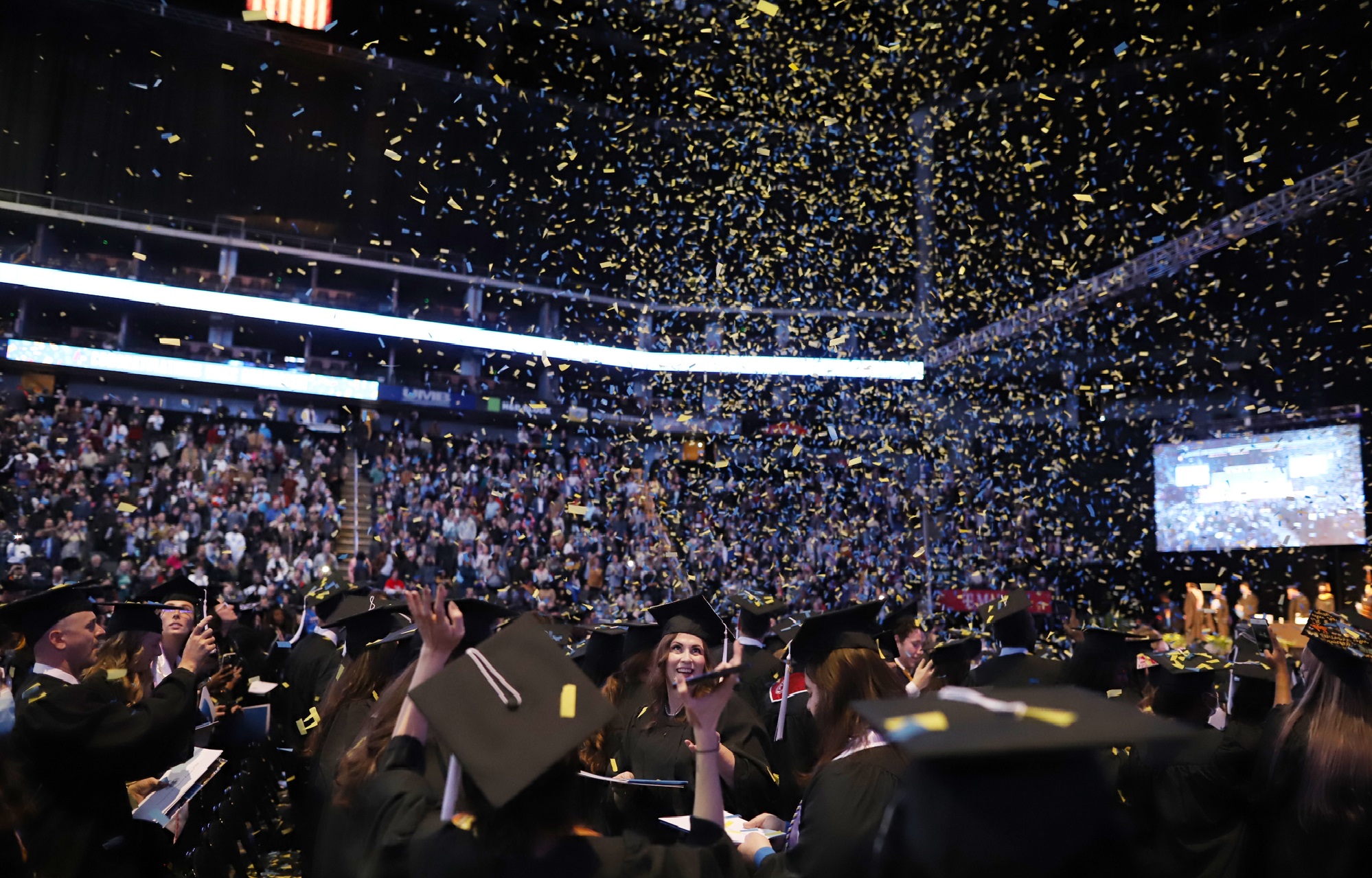
Students reflect on their hard work and achievements during their time at UMKC.
On Sunday, December 18, UMKC’s newest graduating class will walk across the stage, receiving their diplomas after years of hard work and dedication.
Each grad embarked on an individual journey full of professional and personal growth, culminating in a commencement celebration in front of family, friends and peers. Here’s an overview of two such journeys.
Amelia Hess – Master of Arts in Counseling – School of Education, Social Work & Psychological Sciences
Amelia Hess began her collegiate journey at another school, but didn’t find her place among that university community.
She switched to UMKC for her sophomore year and earned her undergrad and, eventually, her master’s degree.
“It’s a microcosm of the Kansas City community. You have all these different people coming here, different majors, different programs,” Hess said. “I was very, very much involved in high school and so I knew when I got to college, I wanted to continue that.”
She found her place at UMKC through involvement with campus organizations, including the Sexuality and Gender Alliance (SAGA), serving as president and the student MC for the Pride Breakfast; the National Alliance on Mental Illness (NAMI); and Roos for Mental Health. She also worked as a residential life coordinator at the Hospital Hill apartments.
“I found places where I could be my different selves,” Hess said. “I found places where I could really enjoy studying psychology and the professional world, but I also found the SAGA council where I could have a leadership position on a queer organization which is hard to find in other places.”
Throughout her career at UMKC, she met with professors, leaders and fellow classmates who have helped her set up her post-graduation plans at an area mental health facility as a therapist associate.
“I’m going to help them implement what they call a psychedelic assisted therapy program, which is kind of a new area of mental health and therapy where people are being administered medicinal treatments for depression, anxiety, PTSD,” Hess said. “I get to take leadership and apply some of those other skills I developed along the years to help create a program and hopefully get it to the point where hopefully one day new grads will come and work there with us.”
Hess credits her willingness to get involved in different groups at UMKC with helping her feel prepared for the next steps in her career.
“I think UMKC, since it is in the metropolitan area and it is a bigger school with more opportunities and connections to the city, is a great opportunity for someone who wants to change schools because you’re supported, but you’re also treated like an adult,” Hess said.
Christian Dang – Bachelor of Science in Biology – School of Science and Engineering
Originally from about 2.5 hours away in Springfield, Missouri, Christian Dang landed at UMKC after looking for an affordable education that also allowed for a change of environment.
“I love Kansas City because of the diversity and everything it provides,” Dang said. “I really like the size of UMKC. It’s like a medium sized institution so it’s not too small or too large and I feel like you can really make more meaningful connections with faculty members that way.”
Dang’s interest in biology started in high school, but when he got to UMKC, he gained a passion for research.
“I still am interested in medicine, but I’m also interested in research, which I’ve been involved a lot with at UMKC,” Dang said. “And I really do think UMKC provides a lot of ways to get involved in research no matter what discipline you are in.”
A four-year Honors Program student, Dang presented his project, “A Self-Directed Mutagenesis Approach for Examining the Drosophila Tribbles Recognition Degron in the C/EBP Transcription Factor SIBO,” at the Summer Undergraduate Research Opportunities (SUROP) Poster Symposium. He also served as a student reviewer and marketing and design coordinator for UMKC’s undergraduate research journal, Lucerna.
He said commencement “is going to be a surreal moment for me having spent these last four years here at UMKC and knowing what a difference it has made in my personal career and personal development.”
After graduation, Dang will travel to Bethesda, Maryland, where he will take part in fellowship at the National Institute of Health (NIH) where he will conduct biomedical research in the Muscle Energetics Laboratory. Only 24 percent of applicants were selected over the past year, according to the NIH.
“It’s definitely humbling, knowing that you’ve been given this opportunity that not everyone has been able to receive,” Dang said. “Knowing to acknowledge the work you’ve done to get this part of your life and knowing people have trust in you that you’re doing to do great things in your life, and you continue to put in the work and effort to be the best you can.”
Dang credits the opportunities provided by UMKC for setting him up to succeed after receiving his diploma and believes others can achieve the same whether they are from the area or from farther away.
“Even from outside Kansas City I would recommend going here for college just because of the community here and the ease of meeting faculty members and peer mentors who will help you and the wide range of student organizations that are available here,” Dang said. “There’s really a lot to offer at UMKC that I feel not a whole lot of people know about.”
Dec 15, 2022
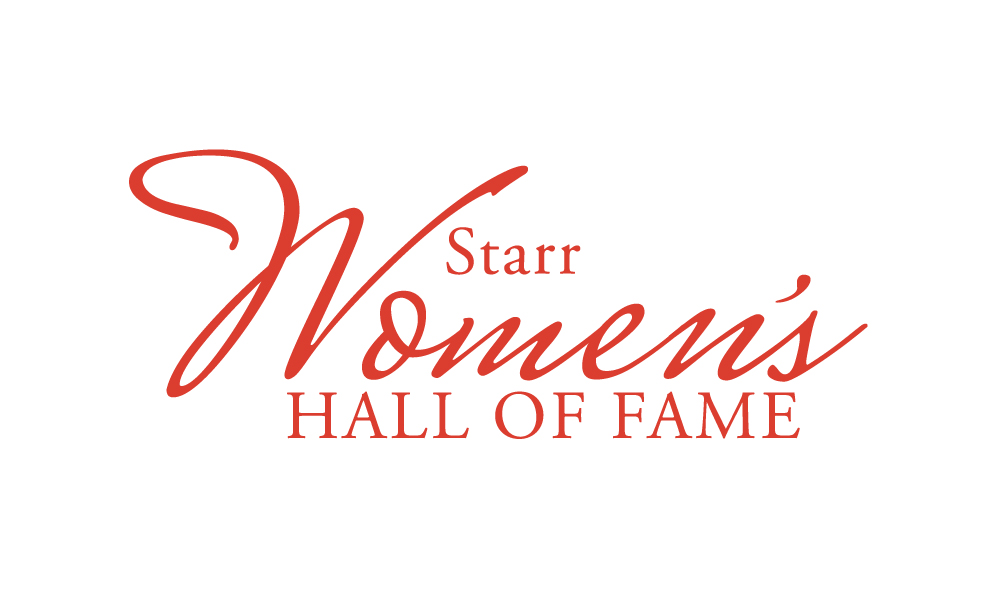
Organization honors Kansas City influential women, past and present
From a protector of parks to a pioneer in LGBTQIA advocacy, from a former U.S. senator to a Major League Baseball owner, from groundbreakers for women in finance to champions of human rights, neighborhoods and Latino issues – the 2023 inductees into the Starr Women’s Hall of Fame have made extraordinary and enduring contributions to their fields of work.
The UMKC Starr Women’s Hall of Fame will induct its fifth class honoring Kansas City women leaders on March 21, 2023, at the Kauffman Center for the Performing Arts. The Kansas City community has benefited from the work of outstanding women from its earliest beginnings, and the Starr Women’s Hall of Fame recognizes their extraordinary accomplishments.
The Hall of Fame recognizes women with noteworthy ties to the Kansas City area who have made important and enduring contributions in their fields of work. Alicia Starr and Michelle Wimes are co-chairs of the 2023 induction ceremony.
“We are honored and excited to recognize these remarkable women who dedicated their time and talents to improving Kansas City for all its citizens,” Starr says. “We celebrate their inclusion in the Hall of Fame so that their stories will inspire future generations of women in Kansas City and beyond.”
The Hall of Fame includes a Wall of Honor on display in the UMKC Miller Nichols Library, as well as an archive of important papers, images and artifacts of the enshrined members. Money raised from the induction event will assist in further development of the digitization and acquisition of materials for the Hall of Fame archives, ensuring that the works of these exceptional women will be accessible in perpetuity not only to community members, but also to researchers world-wide.
The eight outstanding women in the 2023 class of inductees will be honored in a ceremony on Tuesday, March 21. Festivities will commence at 4 p.m. at the Kauffman Center for the Performing Arts. Sponsor opportunities are available at www.umkc.edu/starrhalloffame/.
Event speaker and individual ticket information will be released in January 2023.
The new inductees are:
UMKC alumna Karen L. Daniel (MS ’81 accounting) is a recognized leader in Kansas City. The first African American woman to be a Major League Baseball owner since her addition to the Kansas City Royals ownership group in 2020, Daniel is retired executive director, CFO and president of Global Finance and Technology Solutions at Black and Veatch. She was the first African American female to chair the Kansas City Chamber of Commerce and has been a leader and advocate for restoration of the Liberty Memorial Tower at the National World War I Museum and Memorial. She has created a legacy fund for scholarships to support Black college students. President Barack Obama named Daniel vice chair of the Advisory Council on Doing Business in Africa in 2015.
Anita B. Gorman has been an advocate for area parks, recreation and conservation for six decades. She fought to save the Native American Hopewell archaeological site, which became a part of the Kansas City Parks system. In 1979, she was the first woman appointed to the Kansas City Parks and Recreation board. In this role she raised funds to establish a conservation center in the urban core of Kansas City. Gorman was the first woman to chair the Missouri Conservation Commission and helped establish the Missouri Conservation Heritage Foundation. She received the Pugsley Medal from the American Academy for Park and Recreation Administration in 2017 for her contribution to the promotion, development and conservation of public parks in the United States.
Lea Hopkins has been an advocate and activist for LGBTQIA communities for more than four decades. She co-founded the Christopher Street Association, a gay and lesbian advocacy organization, in 1977 and organized the first Pride parade in Kansas City in 1979. She founded the Kansas City Gay Injustices Fund, which provided legal support for LGBTQIA people who were arrested based on their orientation. She was a member of the inaugural leadership team of the UMKC Gay Students’ Union. Hopkins is an accomplished poet, watercolor artist and collagist.
UMKC alumna Alice Kitchen (MPA ’89) has been a longtime advocate for human rights, healthcare and children and women’s issues. She is co-founder of the Women Quality Coalition and the Child Protection Center. A longtime director of social services at Children’s Mercy Hospital, she was a board member of the Kansas City Housing Authority who helped with neighborhood cleanups and worked to help young mothers obtain health insurance. She was honored by the White House as a Champion of Change for her work on education for the Affordable Care Act in 2015.
Community activist and a leader for the Ivanhoe Neighborhood Council in Kansas City, Mo., Margaret J. May served as the executive director of the Ivanhoe Neighborhood Council from October 2001 to December 2017. During her tenure, the council became a community development corporation that develops new housing and rehabilitates existing homes. The Downtown Council of Kansas City recognized May in their first class of Urban Hero Awards in 2005. She has served on the City of Kansas City Plan Commission and the Kansas City, Missouri Community Development Entity, which is now known as Alt Cap.
Sen. Claire McCaskill has dedicated her life to serving women, families and her community. An accomplished attorney, she was the first woman elected as Jackson County, Missouri prosecutor, and the first woman to be elected U.S. Senator from Missouri. In 2004, she defeated incumbent Governor Bob Holden in the Democratic primary, becoming the first candidate to defeat an incumbent Governor in a primary election in state history, although she lost in the general election. She served as a U.S. senator from Missouri from 2007 to 2019. During her term in the Missouri House of Representatives, she chaired the civil and criminal justice committees. She is currently a political analyst for NBC News and MSNBC.
Barbara Pendleton paved the way for Kansas City women interested in careers in finance. She started her career in banking as a messenger with City National Bank. She became chairperson of City Bank at Crown Center and retired as an executive vice president of United Missouri Bancshares, Inc. An active volunteer in community organizations, she was often the first woman member, officer or president. A founding board member of the Central Exchange, she also chaired the UMKC Women’s Center Advisory Committee. She worked for several mayors, including Mayor Kay Barnes, who appointed her to work on downtown Kansas City revitalization.
UMKC alumna Freda Mendez Smith (BA ’80) is a champion and advocate for the Latino community in Kansas City. A current advisory board member for the Women’s Foundation of Kansas City, she has worked with MANA de Kansas City for four decades, serving as a board member of the national organization twice. Smith is an advocate and mentor to members of the Latino population who encourages people to become engaged in community service, including serving on local boards of directors. She has been a volunteer board member at many community organizations including the UMKC Hispanic Advisory Board, the UMKC Women’s Council, Greater KC Hispanic Heritage and Mattie Rhodes Center.
The Starr Women's Hall of Fame recognizes extraordinary Kansas City women and preserves the history of their accomplishments. To date, The Hall of Fame has inducted 37 Kansas City women, half of them posthumously.
“These women are social reformers, volunteers, philanthropists, business executives, civic leaders, activists and educators,” Wimes says. “They are neighborhood leaders and grassroots organizers, from yesterday and today, both famous and unsung. They are movers and shakers whose tireless commitment to community has made Kansas City a better place to live.”
The Hall of Fame is a repository for their legacies, offering an extensive archive of these women’s activities and achievements available to researchers, educators and historians.
Stuart Hinds, curator of special collections at the Miller Nichols Library, says it’s imperative to preserve these stories.
“These women have had a significant influence on the history and development of the region. Collecting these stories of Kansas City women ensures a more inclusive and thorough historical narrative. Preserving and more importantly, publicly sharing, these stories, allows girls and young women to learn how to overcome the challenges they encounter as they move forward in the world as women.”
A permanent display honoring Hall of Fame members is now open to the public on the third floor of the Miller Nichols Library at the University of Missouri-Kansas City. The library is at 800 E. 51 St., Kansas City, Missouri.
By sharing their stories, the Hall of Fame encourages and inspires women everywhere. Biographies of all of the inductees are available at www.umkc.edu/starrhalloffame/.
The Hall is named in honor of Martha Jane Phillips Starr, a legendary activist and philanthropist who blazed a trail for family issues and women's rights. She played an important role in establishing the university’s Women's Council and the Graduate Assistance Fund, which today provides financial assistance to female students. Starr died in 2011 at the age of 104.
The hall of fame is made possible through the Starr Education Committee, Martha Jane Starr’s family and the Starr Field of Interest Fund, which was established upon her death through the Greater Kansas City Community Foundation. The idea for the Starr Women’s Hall of Fame stemmed from Starr Education Committee members.
The civic organizations that advocate on behalf of women and family issues and have signed on in support of the Starr Women’s Hall of Fame include: American Association of University Women, American Business Women’s Association, Association for Women Lawyers of Greater Kansas City, Central Exchange, CBIZ Women’s Advantage, Girl Scouts of NE Kansas and NW Missouri, Greater Kansas City Chamber’s Executive Women’s Leadership Council, Greater Kansas City Women’s Political Caucus, Jackson County Missouri Chapter of the Links, Inc.; Junior League of Kansas City, Missouri; KC Metro Latinas, Kansas City Athenaeum, Kansas City Young Matrons, OneKC for Women, SkillBuilders Fund, Soroptimist International of Kansas City, Soroptimist Kansas City Foundation, UMKC, UMKC Women’s Center, UMKC Women’s Council, UMKC Women of Color Leadership Conference, United WE, WIN for KC, win|win, Women Leaders in College Sports, Women’s Public Service Network, Zonta International District 7 and Zonta Club of KC II.
Dec 14, 2022
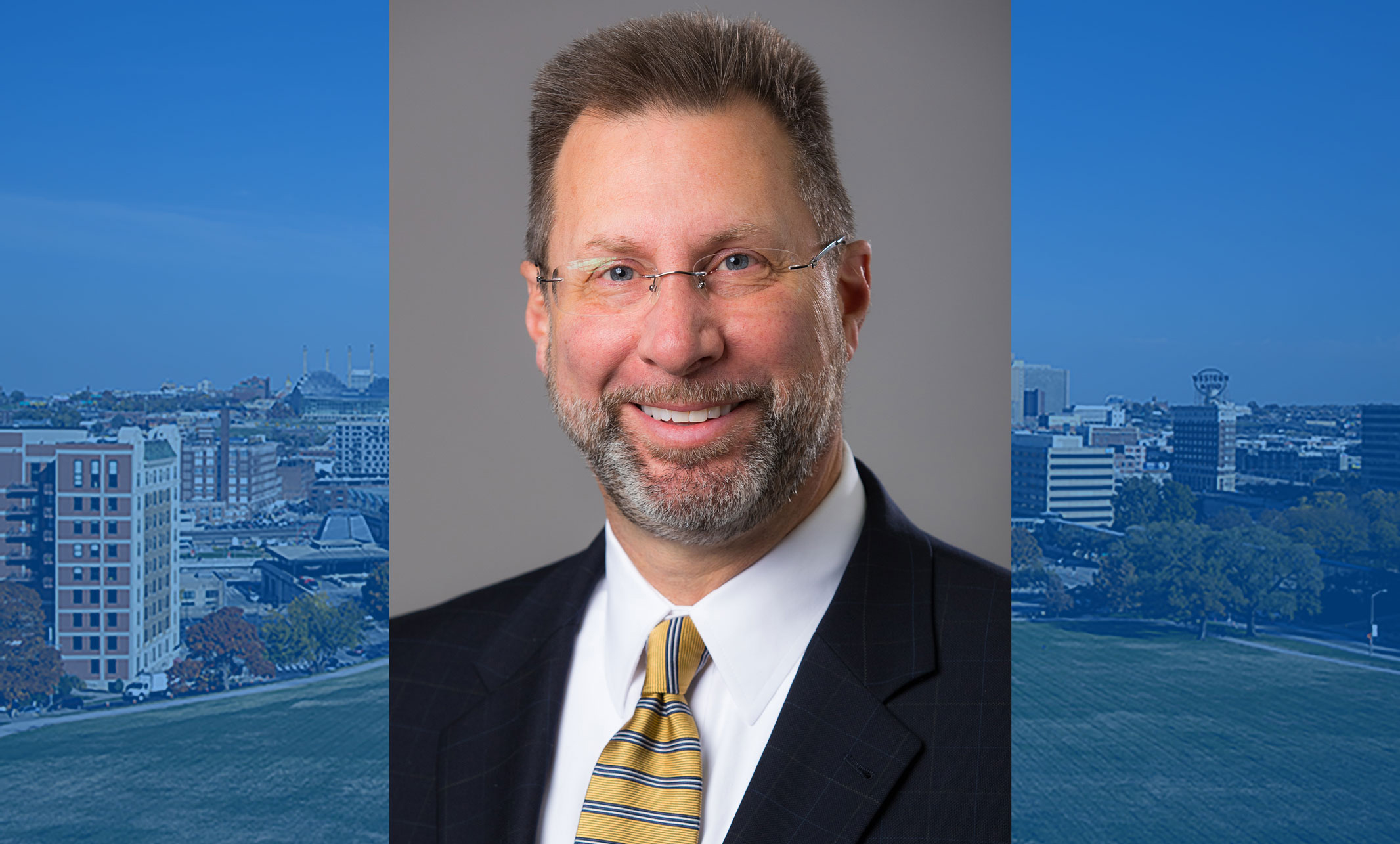
School of Dentistry welcomes Daniel Barwick
Daniel Barwick, Ph.D., has joined the UMKC School of Dentistry as director of philanthropic giving and executive director of the school’s Rinehart Foundation. He brings 20 years of fundraising experience to help lead those efforts with Dean Steven B. Haas.
Barwick, who most recently was director of development at Indiana State University, points to the school’s growth potential and the opportunity to support its community service focus through its oral health clinics. Those clinics are set to expand with the planned construction of a new interprofessional health sciences building on the Health Sciences Campus. Barwick said he is excited to be starting at UMKC during the initial stages of that project.
“Education is a noble endeavor, and it’s amazingly rewarding to be a part of that process,” said Barwick. “Whether I am a fundraiser, a teacher or an administrator, as long as I’m helping to educate people, I’m part of something that I love.”
Barwick has worn many hats in his 30-plus years in higher education. He started as a professor of philosophy, moved into philanthropy and then transitioned to the role of president of Independence Community College in Kansas. He still gets recognized occasionally from those years in Independence, when the school was featured in the Netflix series “Last Chance U” in 2018 and 2019.
Born and raised in New York state, Barwick grew to love the Midwest while attending graduate school at University of Iowa, where he earned a master’s degree in philosophy. His time in Kansas cemented the central Midwest as his home, and when the position at UMKC opened up, he knew it would be a perfect fit.
Outside of his day job, Barwick stays busy with higher education content creation. He has written books on philosophy and higher education leadership and hosts the podcast and blog The Mortarboard, which focuses on solutions in higher education from an administrator’s perspective. He has a passion for cooking, specializing in French cuisine (even though he said his signature dish, eggplant pecorino, hails from Italy). Barwick and his wife live in live in the Kansas City area and have two grown daughters.
Dec 09, 2022
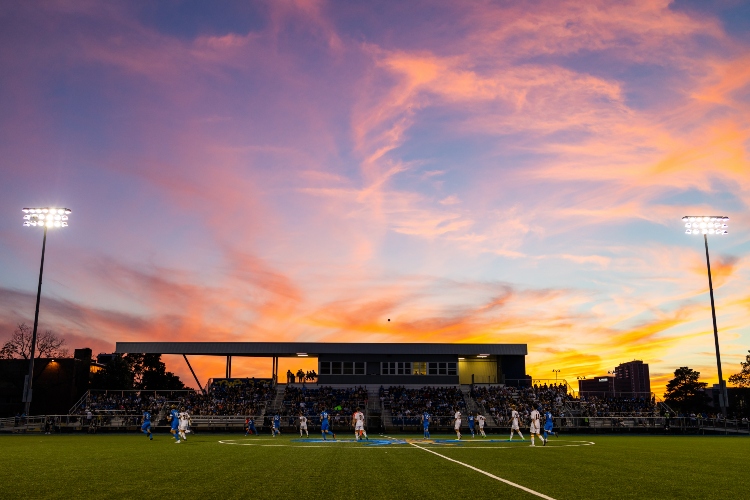
A look back at some of our favorite memories
Our campus photographers spend each day documenting the stories of our students, faculty, staff and community.
Each year they compile some of their favorite images of the connections formed, memories made and moments shared for us to enjoy. Here are the top photos of 2022.
Dec 09, 2022
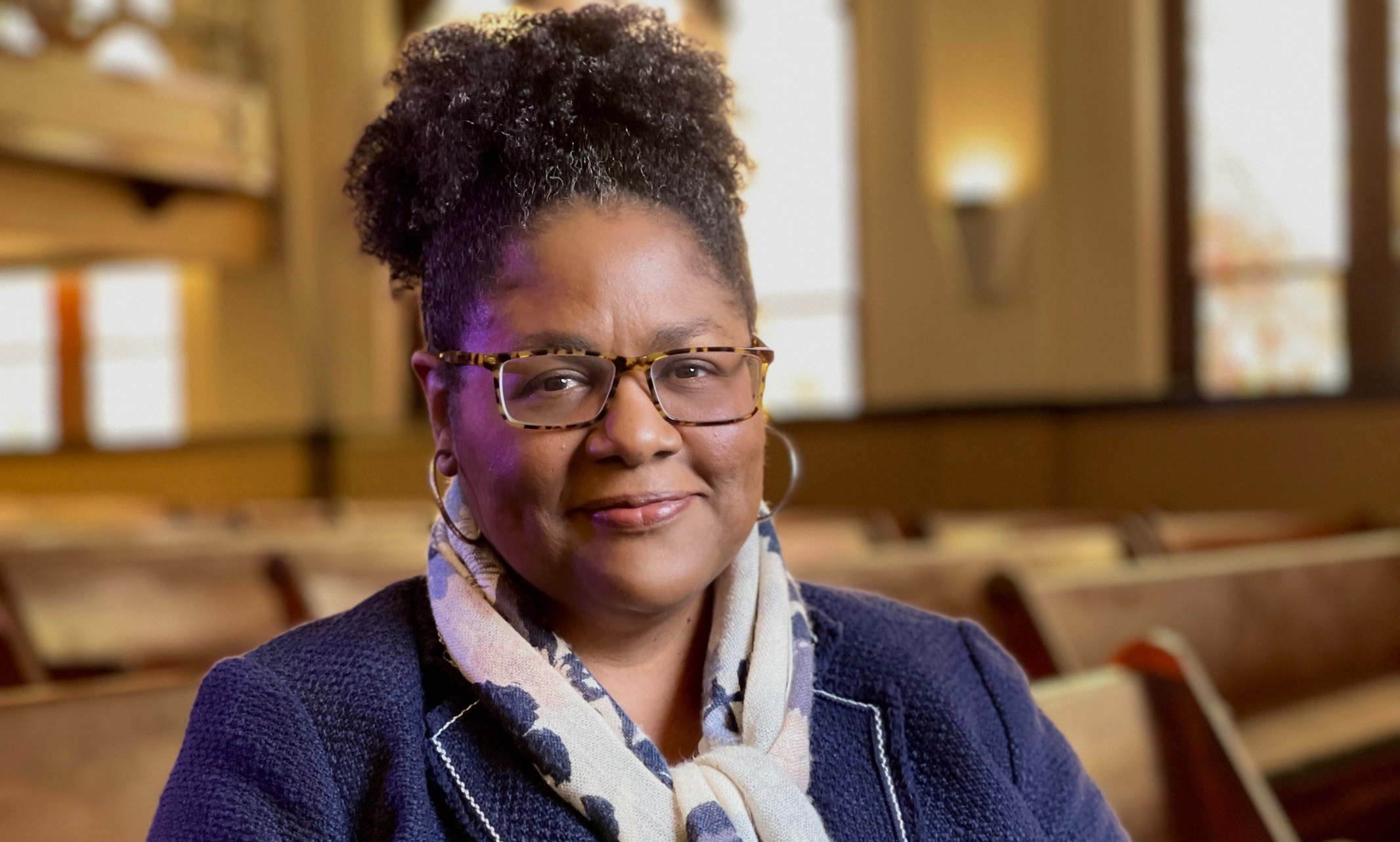
Trial is a continuation of Jannette Berkley-Patton’s Faithful Response to COVID-19 project.
Jannette Berkley-Patton, Ph.D., director of the UMKC Health Equity Institute and a professor in the Department of Biomedical and Health Informatics at the School of Medicine, has received a nearly $2.2 million, two-year grant from the National Institutes of Health for a project designed to increase testing and treatment for COVID-19 by partnering with African American churches and health agencies.
The effort is part of an NIH initiative called Rapid Acceleration of Diagnostics-Underserved Populations (RADx-Up); a consortium of community-engaged research projects designed to increase access to COVID testing in underserved communities.
The randomized trial will study the effectiveness of a religiously tailored intervention in motivating adult African American church and community members to be tested and to seek treatment for COVID-19.
Working with 12 community churches in the Kansas City area, the program will engage the help of pastors to promote testing and demonstrate to their congregations how testing works. Among other services, the churches will also offer rapid COVID testing and provide support and referrals to treatment to those who test positive.
“Our project will examine whether people really want to get tested and seek treatment if we use a religiously tailored approach,” Berkley-Patton said. “We will work collaboratively with our churches to encourage people to not only get the rapid COVID test, but to get treatment that could potentially help reduce their symptoms and likely keep them out of the hospital.
“We’re hoping this approach can be informative not only for this study but for other types of rapid diagnostics that can lead to treatment, especially if the referral is made quickly and support is provided.”
The new grant-funded study is a continuation of Berkley-Patton’s Faithful Response to COVID-19 project, a two-year, NIH-backed clinical trial that started in January 2021 to promote COVID-19 testing with the African American community with the support of churches and other faith-based and community organizations.
Those efforts were so successful in testing and raising awareness that the Jackson County Legislature awarded a $5 million grant to support Our Healthy Kansas City Eastside, another UMKC Health Equity Institute project that administered nearly 13,000 COVID vaccinations to members of Kansas City’s minority and underrepresented communities in just 18 months. The county recently extended that program as well with the support of an additional $5 million grant.
“In the early days of the pandemic, COVID testing was not available to everyone. Access to testing was particularly limited in underserved communities, which led to the NIH initiative RADxUP,” Berkley-Patton said. “In the initial project, we are demonstrating that people will take the test at a church site – and even more so when the efforts are religiously and culturally tailored.”
The new study will examine the beliefs and practices of those in underserved communities toward rapid COVID-19 self-testing. Researchers also will study the effectiveness of contact tracing as well as care services such as referrals to treatment, health insurance and community resources.
“With this model, many of our Faithful Response materials are packaged in an easy-to-use toolkit that our community partners helped to create, and can be disseminated in print or electronic formats,” Berkley-Patton said. “We’re hoping the toolkit can be widely disseminated across the country if we can show that the first Faithful Response project was effective and double that up with efficacy of the second project.”
Dec 08, 2022
